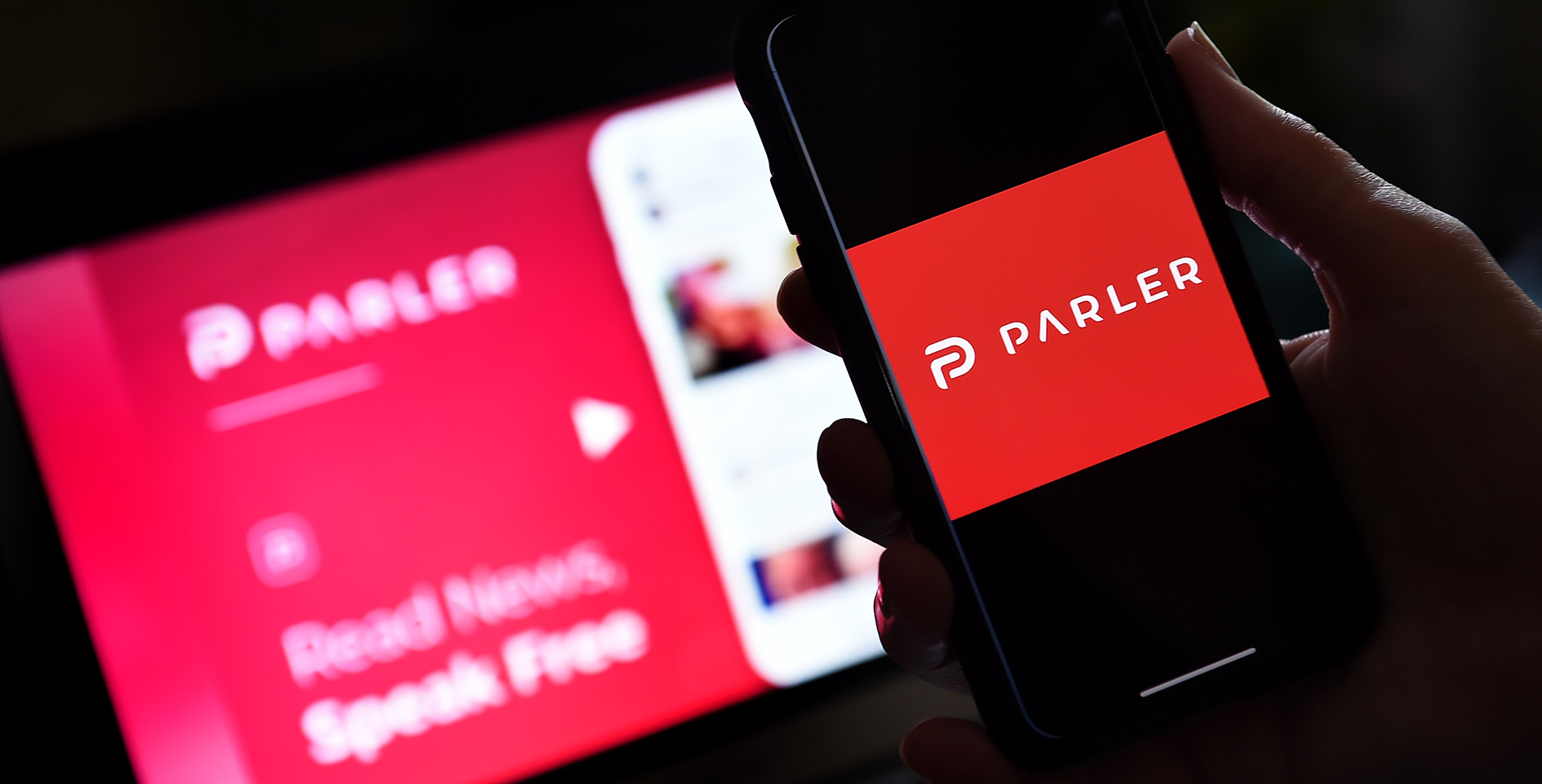In recent months, a new social media platform gained growing popularity in light of controversies over content moderation and fact-checking on traditional social media sites like Twitter and Facebook. Parler was launched in August of 2018 by John Matze, Jared Thomson, and Rebekah Mercer. While it still has a smaller user base than most social platforms at just over 2.8 million people, the app saw a surge in downloads following the November 2020 presidential election and has become extremely popular in certain circles of our society. It became the #1 downloaded application on Apple and Google devices soon after the 2020 presidential election, with over 4 million downloads in just the first two weeks of November, according to tracking by Sensor Tower.
Here is what you should know about this social media application and why it matters in our public discourse.
What is Parler?
Parler, named after the French word meaning to speak, is described as a “free speech” alternative to traditional social media sites like Twitter and Facebook. The company’s website describes the platform as a way to “speak freely and express yourself openly, without fear of being ‘deplatformed’ for your views.” Parler intentionally positions itself as the “world’s town square,” and CEO John Matze said of the app, “If you can say it on the street of New York, you can say it on Parler.”
Parler is a microblogging social service, very similar to Twitter, where users are encouraged to share articles, thoughts, videos, and more. The platform states that “people are entitled to security, privacy, and freedom of expression.” This emphasis on privacy is seen in the ways that Parler will keep your data confidential and won’t sell your data to third parties services, which is a complaint about the nature of other platforms and their business models based on ad revenue. Currently, Parler does not have advertisers on the platform, but they have plans to allow advertisers to target influencers instead of regular users.
Posts on the platform are called “parleys,” and the feed is broken up into two sections namely parleys and affiliate content, which functions like a news feed of content providers for the platforms. To share content from someone else, a user can “echo” a certain post or piece of content.
The platform also has a “Parler citizen verification,” where users can be verified by the service in order to cut down on fake accounts and ones run by bots. Users that submit their photo ID and a selfie are eligible for verification. Once verified, users will see a red badge on their avatar indicating that they are a Parler citizen. Parler also has a “verified influencer” status for those with large followings who might be easily impersonated, very similar to the “blue check” icon on Twitter.
Does Parler censor or moderate content?
The company claims that it does not censor speech or content, yet it does have certain community standards much like other platforms, even if those standards are intentionally set low. The community standards are broken into two principles:
- Parler will not knowingly allow itself to be used as a tool for crime, civil torts, or other unlawful acts.
- Posting spam and using bots are nuisances and are not conducive to productive and polite discourse.
Outside of these two community standard principles, Parler does have a more detailed account of the type of actions that fall under the principles. The platform is intentionally designed in order to give users some tools to deal with spam, harassment, or objectionable content including “the ability to mute or block other members, or to mute or block all comments containing terms of the member’s choice.”
Overall, Parler is designed to be an alternative platform for those who do not agree with the community standards and policies of other social platforms. The company states that “while the First Amendment does not apply to private companies such as Parler, our mission is to create a social platform in the spirit of the First Amendment.” This is an important point in the debate over content moderation on other platforms though because as the company points out, the First Amendment does not apply to private companies but was written to reflect the relationship between individuals and the state.
Why is Parler controversial?
As the platform has gained prominence in certain segments of American life, Parler has expanded its user base in large part as a reaction to the content moderation policies on other platforms. Because it has promised to allow and highlight content that other services deem misinformation, contested claims, and at times hate speech, Parler has been characterized by what it allows its users to post without fear of removal or moderation.
Relying on users to moderate or curate their own feeds, Parler seeks to abdicate themselves of any responsibility of what is posted on their platform. The application has also become incredibly partisan, with a large number of users joining the platform after the 2020 presidential election amidst the growing distrust in the ways that other social media label controversial content, misinformation, and fake news.
Currently, Parler has a large number of users from one side of the political spectrum, which can at times lead to a siloing effect where a user only sees one side of an argument. This was one of the issues of traditional social media that Parler set out to overcome with its lax moderation policies in the first place.
Is it a safe platform?
Parler states that any user under 18 must have parental permission to gain access to the application, and all users under 13 are banned. But the service does not currently have an age verification system. Users can also change settings on their account to keep “sensitive” or “Not Safe for Work” content from showing in their feeds automatically. The Washington Post also reports that Parler does not currently have a robust system for detecting child pornography before it is viewed or potentially flagged and reported by users. A company spokesman has said, “If somebody does something illegal, we’re relying on the reporting system. We’re not hunting.”
Given its lack of robust content moderation policies, Parler has drawn a considerable number of users from Twitter and other platforms who decry that their views were censored or their accounts banned. Many conservative elected officials and news organizations have joined the platform, which hopes to attain a critical mass of users large enough to sustain the platform moving forward. Parler currently does not have the amount of brands or companies that other platforms have, which can be needed for a platform to flourish as an information source and connectivity tool for users.
Parler banned pornography on the platform but in recent months changed its content moderation policies to allow for pornography on the platform. This aligns it more with Twitter’s policy allowing this graphic content online. Parler’s approach to moderation can be seen in recent comments by COO Jeffrey Wernick to the Post in response to allegations of the proliferation of pornography on the site. Wernick responded that he had little knowledge of that type of content on the platform, adding, “I don’t look for that content, so why should I know it exists?” He later added that he would look into the issue.
Since the shifts in policy in recent months, Parler has suffered from issues surrounding the proliferation of pornography and spam, which should come as no surprise as the pornography industry has been using innovative technology from the early days of the internet. Parler states that it allows anything on its platform that the First Amendment allows. The United States Surpreme Court has declared that pornography is constitutionally protected free speech.
It should be noted that Facebook, Instagram, and YouTube ban all pornographic imagery and videos from their platforms. Facebook and Instagram use automated systems to scan photos as they are posted and also rely on a robust reporting system for users to flag content that may violate the company’s community standards. While Twitter’s policies allow for pornography, it does employ automated systems to cut down on rapid posting and other spam-related uploads as well as the use of human moderators to cut down on abuse from users and bots.
Should social media companies be able to censor speech and enforce content moderation policies on users?
This is at the heart of the debate over free speech and social media, especially centering around Section 230 of the Communications Decency Act, which is a part of the Telecommunications Act of 1996. Section 230 has been called the law that gave us the modern internet. The law allowed a more open and free market of ideas and for the creation of user-generated content sites.
As the ERLC wrote in 2019, many social conservatives, worried about the spread of pornography, lobbied Congress to pass the the Communications Decency Act, which penalized the online transmission of indecent content and protected companies from being sued for removing such offensive content. Section 230 was written with the intention of encouraging internet companies to develop content moderation standards and to protect them against liability for removing content in order to have safer environments online, especially for minors. This liability protection led to the development of community standards and ways to validate information posted without the company being liable for user-generated content.
Controversy over the limits of Section 230 and ways to update the law have been center stage in American public life for the last few years, especially as the Trump administration issued an Executive Order on the prevention of online censorship. Both sides of the political aisle are debating if it should simply be updated or if the statute should be removed completely.










